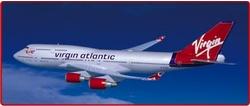Tout Coconut-Derived Fuel As Sustainable Energy Source
 On Sunday, Boeing,
Virgin Atlantic and GE Aviation conducted what those companies
called the first commercial aviation flight using a sustainable
fuel from biomass, mixed with traditional kerosene-based jet
fuel.
On Sunday, Boeing,
Virgin Atlantic and GE Aviation conducted what those companies
called the first commercial aviation flight using a sustainable
fuel from biomass, mixed with traditional kerosene-based jet
fuel.
The Virgin Atlantic 747-400 -- registration GV-WOW, operating as
Flt. VS811P -- flew using a biofuel blend composed of babassu oil
and coconut oil provided by Seattle-based Imperium Renewables. Both
oils are economically and socially sustainable, according to the
companies, and can be found in everyday cosmetic products including
lip balm and shaving cream.
In addition, the babassu nuts and coconuts were harvested from
existing, mature plantations. No modifications were made to either
the aircraft or its engines to enable the flight to take place.
"Today marks a biofuel breakthrough for the whole airline
industry," said Sir Richard Branson, president of Virgin Atlantic.
"Virgin Atlantic and its partners have proved that you can find an
alternative to traditional jet fuel and fly a plane on biofuel.
This pioneering flight will enable those of us who are serious
about reducing our carbon emissions to go on developing the fuels
of the future, fuels which will power our aircraft in the years
ahead."
 Babassu oil comes from
the nuts of the babassu tree, which is native to Brazil. In
addition to its cosmetic uses, its leaves are used to make roofs
and paper, which in turn is used to create folders, bags and soap
boxes. Coconut oil is used for a variety of applications including
oil for biodiesel used in ground transportation. Most coconut
plantations are mature and don't contribute to deforestation, while
coconut farming is also highly carbon-neutral, according to
Boeing.
Babassu oil comes from
the nuts of the babassu tree, which is native to Brazil. In
addition to its cosmetic uses, its leaves are used to make roofs
and paper, which in turn is used to create folders, bags and soap
boxes. Coconut oil is used for a variety of applications including
oil for biodiesel used in ground transportation. Most coconut
plantations are mature and don't contribute to deforestation, while
coconut farming is also highly carbon-neutral, according to
Boeing.
"Today's flight is a continuation of a journey we embarked on
last year with Sir Richard Branson and Virgin Atlantic to identify
more sustainable forms of fuel for the aviation industry," said
Marlin Dailey, vice president of Sales, Europe, Russia and Central
Asia, Boeing Commercial Airplanes. "Change begins with a vision.
Following that, innovation and technologies are essential to
proving the feasibility of renewable, alternative fuel sources for
an environmentally progressive future of aviation."
The biofuel-powered Boeing/Virgin/GE flight was also
significantly different from the flight earlier this month by an
Airbus A380. That aircraft was powered by a synthetic liquid fuel
processed from natural gas on its three-hour flight from
Filton, England to Toulouse, France.
"The partnership between Virgin Atlantic, Boeing, GE and
Imperium Renewables has advanced our understanding of biofuels for
aviation applications," said GE Aviation Manager of Advanced
Combustion Engineering Dr. Tim Held. "Prior to this historic
flight, the engine ground testing conducted by GE and CFM
International required no hardware modifications to the engine, and
the fuels performed as expected."
 "A successful flight
will not only validate the use of biofuels in aviation, but also
provide a glimpse into the future of all fuels," said Imperium
Renewables President and CEO John Plaza prior to the flight.
"Today's biojet fuel offers higher-quality standards and a more
sustainable fuel than traditional jet fuel. Additionally, it
illustrates the potential for second-generation biojet fuel to be
even more viable in the coming years."
"A successful flight
will not only validate the use of biofuels in aviation, but also
provide a glimpse into the future of all fuels," said Imperium
Renewables President and CEO John Plaza prior to the flight.
"Today's biojet fuel offers higher-quality standards and a more
sustainable fuel than traditional jet fuel. Additionally, it
illustrates the potential for second-generation biojet fuel to be
even more viable in the coming years."
The results of the biofuel flight will be analyzed by the
collective team and used for research and development of
next-generation biofuels that can help to further reduce carbon
emissions. Boeing will use findings from this flight as a baseline
for conducting another biofuel flight later this year with Air New
Zealand.
 NTSB Prelim: Lee Aviation LLC JA30 SuperStol
NTSB Prelim: Lee Aviation LLC JA30 SuperStol Classic Aero-TV: Curtiss Jenny Build Wows AirVenture Crowds
Classic Aero-TV: Curtiss Jenny Build Wows AirVenture Crowds ANN's Daily Aero-Term (05.30.25): Very High Frequency (VHF)
ANN's Daily Aero-Term (05.30.25): Very High Frequency (VHF) Aero-News: Quote of the Day (05.30.25)
Aero-News: Quote of the Day (05.30.25) Classic Aero-TV: Quest Kodiak Enhances Migration Monitoring Programs
Classic Aero-TV: Quest Kodiak Enhances Migration Monitoring Programs




